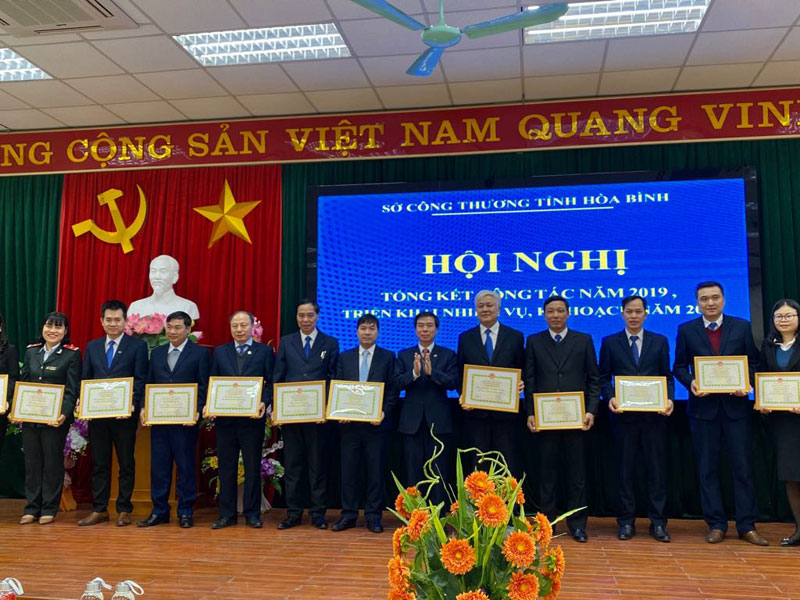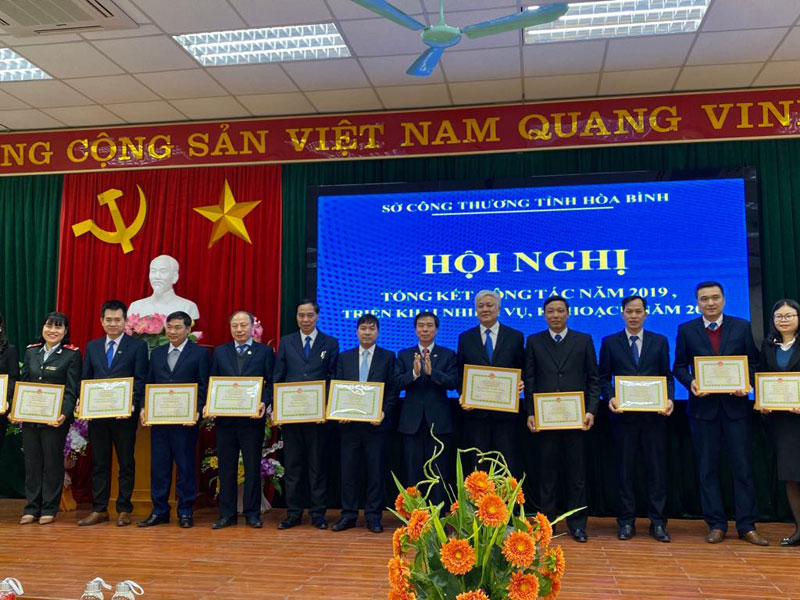
(HBO) – The Department of Industry and Trade of the north-western province of Hoa Binh recently held a conference to review work in 2019 and launch this year’s tasks.
Vice Chairman of the provincial People’s
Committee Bui Duc Hinh attended and directed the event.
 The provincial Department of Industry and Trade
honours collectives and individuals.
The provincial Department of Industry and Trade
honours collectives and individuals.
In 2019, the department fulfilled and
surpassed all the targets assigned by the provincial People’s Council and
People’s Committee. The province’s industrial production value was estimated at
37.39 trillion VND (1.61 billion USD) in the year, exceeding the yearly plan by
0.01 percent.
Export turnover hit 791.9 million USD, a
year-on-year surge of 24.48 percent and meeting the year’s plan. Consumer price
index in December rose 0.88 percent compared to the previous month and 1.85
percent against 2018, while the rate of households connected to the national
grid stood at 99.75 percent.
This year, the sector targets an industrial
production value of more than 43 trillion VND, up 15 percent compared to that
in 2019. Growth rate of industrial value added is projected at 11.8 percent.
Retail sales and services revenue are forecast
to rake in 37.68 trillion VND, while export turnover is expected to fetch 1.03
million USD, a year-on-year increase of 30.3 percent. The province will work to
raise the rate of families connected to the national grid to 99.8 percent.
Addressing the conference, Vice Chairman
Hinh spoke highly of the 2019 results of the province’s industry and trade
sector, stressing that in the important year of the 16th provincial Party
Congress’ resolution implementation, the sector needs to show great
determination in carrying out key tasks and solutions in boosting industry and
handicraft development.
The sector will launch projects and plans
on the restructuring of the industries, creating brand products with high
competitiveness at home and in regional and international markets.
Regarding trade and import-export, it was
advised to work with relevant agencies in removing bottlenecks for
businesses./.
According to data from the Hoa Binh Provincial Party Committee, the industrial production index for the first six months of 2025 is estimated to have increased by 20% compared to the same period last year. This marks the highest year-on-year growth rate for this period since 2020.
In the first six months of 2025, Hoa Binh province’s export turnover was estimated at 1.145 billion USD, marking an 18.11% increase compared to the same period in 2024. Import turnover was estimated at $ 804 million, a 17.15% increase, which helped the province maintain a positive trade balance.
The lives of the ethnic minority farmers in Tan Lac district have gradually improved thanks to the new directions in agricultural production. This is a testament to the collective strength fostered through the professional associations and groups implemented by various levels of the district’s Farmers’ Union.
With the motto the "product quality comes first,” after nearly one year of establishment and operation, Muong village’s Clean Food Agricultural and Commercial Cooperative, located in Cau Hamlet, Hung Son Commune (Kim Boi district), has launched reputable, high-quality agricultural products to the market that are well-received by consumers. The products such as Muong village’s pork sausage, salt-cured chicken, and salt-cured pork hocks have gradually carved out a place in the market and they are on the path to obtaining the OCOP certification.
In the past, the phrase "bumper harvest, rock-bottom prices" was a familiar refrain for Vietnamese farmers engaged in fragmented, small-scale agriculture. But today, a new spirit is emerging across rural areas of Hoa Binh province - one of collaboration, organisation, and collective economic models that provide a stable foundation for production.
Maintaining growing area codes and packing facility codes in accordance with regulations is a mandatory requirement for agricultural products to be eligible for export. Recently, the Department of Agriculture and Environment of Hoa Binh province has intensified technical supervision of designated farming areas and packing facilities to safeguard the "green passport" that enables its products to access international markets.



 The provincial Department of Industry and Trade
honours collectives and individuals.
The provincial Department of Industry and Trade
honours collectives and individuals.